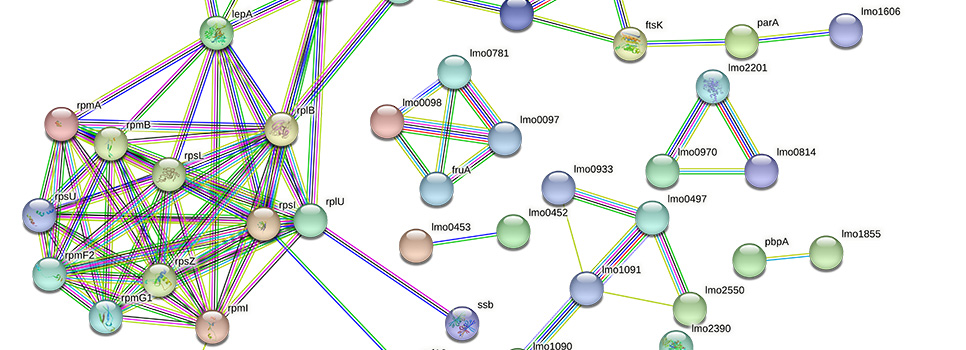LISTERIA MONOCYTOGENES AND THE ROLE OF PROTEOMICS: DELVING DEEP INTO A FOODBORNE PATHOGEN

A study that explores the adaptation and behaviour of a significant foodborne pathogen. The importance of advanced analytical techniques to better understand the microorganism's virulence.
Proteomics is a branch of molecular biology that focuses on the comprehensive analysis of proteins found within a cell or microorganism. In particular, it studies the profile of proteins, their interactions, and functions. This technique has paved new ways for understanding molecular mechanisms, allowing scientists to gain a deeper, more detailed insight into how living organisms operate and how they respond to their environment.
Indeed, proteomics is at the heart of two scientific papers, carried out by the Istituto Zooprofilattico of Teramo in collaboration with the University of Teramo, delving into the role of this discipline in understanding the behavior and adaptation of Listeria monocytogenes, a microorganism well-known in the world of microbiology and food industry. Listeria is a persistent challenge for researchers due to its ability to cause listeriosis, a severe illness especially for immunocompromised patients, the elderly, pregnant women, and newborns. Furthermore, its widespread presence, particularly in food production environments, makes it a subject of crucial importance in the field of food safety. The challenge of preventing food contamination by Listeria monocytogenes is not just about the microorganism itself, but also about the complexity of what we consume. Foods are complex matrices where bacteria can undergo physiological and structural changes, which not only allow them to resist but also to grow and express genes associated with increased virulence.
The first research, published in the scientific journal Foods, utilized proteomic methods to analyze how Listeria reacts to various stress conditions, adapting to adverse environmental contexts such as acidity, low temperatures, and high salt concentrations. "We wanted to study in detail - explains Federica D’Onofrio, a researcher at IZSAM and PhD student in Food Sciences with Professor Maria Schirone - how the microorganism modulates its protein expression in response to the environmental situations it encounters. This allowed us to observe how some proteins, essential for virulence, are produced only under certain stress conditions."
The second study, published in Frontiers in Microbiology, further highlighted the importance of proteomics in exploring Listeria's resistance mechanisms. This research, in particular, addressed the ability to form biofilms (organized and protected communities of microorganisms embedded in a polymeric matrix) as a resistance strategy. "We compared - continues D’Onofrio - a strain isolated from a food matrix and a reference strain, to see if the 'naturally occurring' strain had a greater ability to express proteins involved in stress resistance pathways and virulence compared to the reference one". Advanced techniques, such as mass spectrometry, provided a detailed map of the microorganism's response mechanisms, highlighting over a thousand proteins.
Combining the information from both studies paints a broader picture of the adaptive strategies of L. monocytogenes, with a deeper understanding of this pathogen that can translate into innovative strategies for its control in the food context. "The ability to identify and characterize proteins," says Mirella Luciani, from the Immunology and Serology Department of IZSAM, last author of the two papers - can give us crucial insights into how these bacteria manage to survive under various conditions, guiding us towards more efficient strategies to prevent and control food contamination. Our results showcase the power of combined bioinformatics and proteomic approaches in analyzing vast amounts of data and identifying patterns and associations that would be difficult to detect using traditional laboratory methods. It's a methodology that in the future can also be applied to other pathogenic organisms to gain a better understanding of their biology and their ability to cause infections".
STRESS ADAPTATION RESPONSES OF A LISTERIA MONOCYTOGENES 1/2A STRAIN VIA PROTEOME PROFILING
D’Onofrio F, Schirone M, Paparella A, Krasteva I, Tittarelli M, Pomilio F, Iannetti L, D’Alterio N, Luciani M. Stress Adaptation Responses of a Listeria monocytogenes 1/2a Strain via Proteome Profiling. Foods. 2023; 12(11):2166.
https://doi.org/10.3390/foods12112166
D'Onofrio, F., Schirone, M., Krasteva, I., Tittarelli, M., Iannetti, L., Pomilio, F., ... & Luciani, M. A comprehensive investigation of protein expression profiles in L. monocytogenes exposed to thermal abuse, mild acid, and salt stress conditions. Frontiers in Microbiology, 14, 1271787.

Mirella Luciani

Federica D’Onofrio
Istituto Zooprofilattico Sperimentale
dell'Abruzzo e del Molise "G. Caporale"
Campo Boario | 64100 TERAMO | ITALIA
Telefono 0039.0861.3321 | Fax 0039.0861.332251
e-mail: archivioeprotocollo@izs.it
Posta elettronica certificata: protocollo@pec.izs.it
Partita IVA: 00060330677
Codice Fiscale: 80006470670


